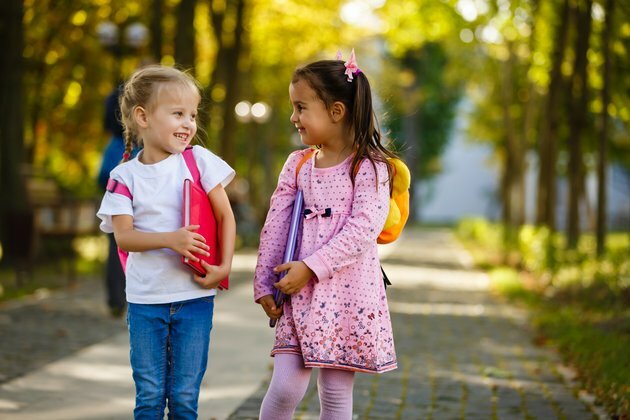Children learn through play - it shouldn't stop at preschool
The Conversation
18 Nov 2019, 01:49 GMT+10

The transition from preschool to school is a big deal for many children and parents. Over the next few weeks, many preschoolers will take part in a transition program, designed by their teachers, to prepare them for school.
They'll meet their foundation teachers, spend some time in a classroom and hopefully make some new friends.
These children's education has so far focused on play-based learning. This means they've learnt through exploring and playing, supported by skilled early childhood educators.
But they're about to enter a world of formal learning. Although play-based learning does happen in schools, there tends to be a stronger focus on instruction.
The current system isn't working for many students. One-quarter of children who start school aren't developmentally ready for this transition and levels of mental ill-health among children are concerning.
Read more: More children are starting school depressed and anxious - without help, it will only get worse
Many educators and researchers argue more play in the early years of school could better support children's transition and learning. Parents think so too. In a recent survey, 93% of parents acknowledge the benefits of play and 72% said the first years of school should focus more on play-based learning.
If we're genuinely committed to improving outcomes for all children - and we know play benefits learning - we need to better integrate play-based learning into schools' formal learning structures.
How do we learn through play?
Increasing play-based learning in schools means changing how we think about playing. When many of us think about play, we probably think of free play, which is unstructured and directed by children, usually without adult involvement.
Play-based learning, though, is more usefully conceived as a spectrum, with free play at one end and teacher-guided, playful learning at the other. In between are a variety of methods either entirely based on play, or incorporating elements of it.
For example, a skilled educator can help children discover new ideas when they play with water. The educator might encourage children to playfully experiment with water tubs and toys in a way that allows them to develop their own hypotheses about how water behaves in certain situations and why.
The educator could work with the children to test their hypotheses, questioning and talking to them about what they observe during their play.
Play-based learning in the early years of school can significantly improve kids' language and social connections. Research shows the impact of play-based learning extends into other areas of development too.
High-quality play-based learning can:
strengthen neural pathways associated with learning enhance well-being improve memory and organisational abilities teach children self-regulation and problem-solving skills encourage creativity and critical thinking.
Quality depends on warm and responsive relationships with skilled educators and an environment that facilitates exploration and learning. It also involves a developmentally appropriate learning program.
The skills children learn through play equip them to engage with formal, academic learning. When children start to develop and harness these skills, research shows they're better able to cope with the demands of formal learning and thrive later on in school.
And when more than 70% of children don't get the recommended amount of physical activity, play is even more essential.
Read more: Let them play! Kids need freedom from play restrictions to develop
Many researchers and educators believe less play - inside and outside the classroom - may be contributing to rising levels of anxiety, depression, and challenges related to attention and self-control. For children experiencing high levels of stress or other forms of disadvantage, play can be a vital antidote.
The links between disadvantage, poor health, changing lifestyles, and inequality are, of course, complex. But there is good evidence to suggest how we approach education in the early years - particularly in relation to play - is an important part of how we address these challenges.
Australia's school system downplays play
The Australian Early Years Learning Framework guides educational programs for children aged 0-5. It complements the Australian Curriculum, which guides learning throughout primary and secondary school.
While complementary, the frameworks take quite different approaches to play. Play is a fundamental component of the Early Years Learning Framework. In contrast, the curriculum's focus on academic performance has extended formal learning to the early years of school and even preschool, despite the fact play-based learning is far more appropriate at these ages.
There are a few policy options that can support more play-based learning in the early years and ensure it is integrated into education in the middle years of childhood and beyond. These options include:
starting school later (either by changing legal starting ages or parents electing to start their children later) more or longer breaks for play during the day extending play-based approaches into the early years of school integrating more play-based learning into existing approaches.
Read more: Which families delay sending their child to school, and why? We crunched the numbers
Increasing school starting ages by law would involve governments and parents meeting the significant cost of an extra year of early education and care. Research shows most parents want less break time at school, and schools are already finding it difficult to adequately cover the curriculum in the time they have.
While some policy options are likely to gain more traction than others, there is strong support for increasing play-based learning in schools. This will require teachers, governments and families to all be on the same page about the benefits of play for children's learning.
Author: Kate Noble - Education Policy Fellow, Mitchell Institute, Victoria University 
 Share
Share
 Tweet
Tweet
 Share
Share
 Flip
Flip
 Email
Email
Watch latest videos
Subscribe and Follow
Get a daily dose of Miami Mirror news through our daily email, its complimentary and keeps you fully up to date with world and business news as well.
News RELEASES
Publish news of your business, community or sports group, personnel appointments, major event and more by submitting a news release to Miami Mirror.
More InformationBusiness
SectionWall Street extends rally, Standard and Poor's 500 hits new high
NEW YORK, New York - U.S. stock markets closed firmly in positive territory to start the week Monday, with the S&P 500 and Dow Jones...
Canadian tax on US tech giants dropped after Trump fury
WASHINGTON, D.C.: On Friday, President Donald Trump announced that he was halting trade discussions with Canada due to its decision...
Trump-backed crypto project gets $100 million boost from UAE fund
LONDON, U.K.: A little-known investment fund based in the United Arab Emirates has emerged as the most prominent public backer of U.S....
DIY weight-loss drug trend surges amid high prices, low access
SAN FRANCISCO, California: Across the U.S., a growing number of people are taking obesity treatment into their own hands — literally....
Apple allows outside payment links under EU pressure
SAN FRANCISCO, California: Under pressure from European regulators, Apple has revamped its App Store policies in the EU, introducing...
Euro, pound surge as U.S. rate cut odds grow after Powell hint
NEW YORK CITY, New York: The U.S. dollar tumbled this week, hitting its lowest levels since 2021 against the euro, British pound, and...
International
SectionFox faces $787 million lawsuit from Newsom over Trump phone call
DOVER, Delaware: California Governor Gavin Newsom has taken legal aim at Fox News, accusing the network of deliberately distorting...
DeepSeek faces app store ban in Germany over data transfer fears
FRANKFURT, Germany: Germany has become the latest country to challenge Chinese AI firm DeepSeek over its data practices, as pressure...
Canadian option offered to Harvard graduates facing US visa issues
TORONTO, Canada: Harvard University and the University of Toronto have created a backup plan to ensure Harvard graduate students continue...
Israel should act fast on new peace deals, Netanyahu says
JERUSALEM, Israel: Israeli Prime Minister Benjamin Netanyahu says that Israel's success in the war with Iran could open the door to...
UN offer rejected in Dreamliner crash investigation
NEW DELHI, India: India has decided not to allow a United Nations (UN) investigator to join the investigation into the recent Air India...
UN climate agency gets 10 percent boost amid global budget cuts
BONN, Germany: Despite widespread belt-tightening across the United Nations, nearly 200 countries agreed this week to increase the...













